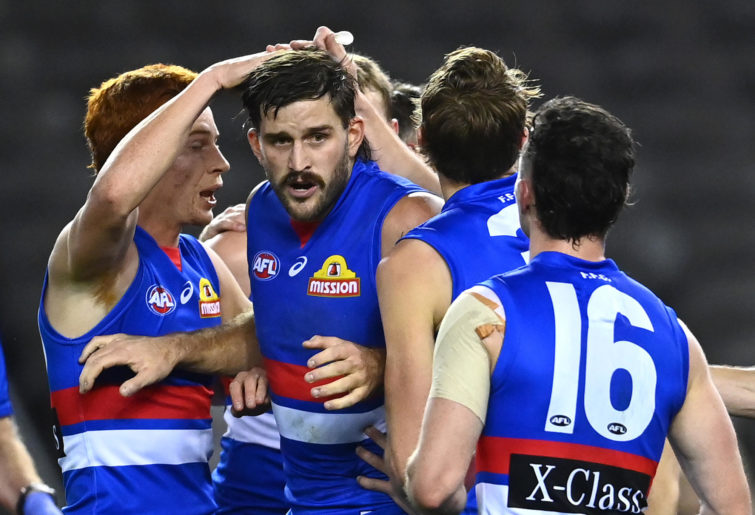Forget Cripps, Curnow and Walsh - the unsung Blues heroes driving Carlton's premiership push
The Blues have truly stood up and are a genuine flag threat in 2024 and they have their younger brigade of troops to thank for it.
Opinion
The pecking order is effectively a ladder of the manner in which the teams that played in the round performed, therefore it’s not purely based on results.
Round 8 proved to be a challenging round to rank teams with six of the nine games with the team claiming victory having a winning margin of 13 points or less. What that means is that there wasn’t much separating the teams in terms of performance with the exception of West Coast absolutely obliterating Collingwood and Geelong controlling the game they played in wet conditions against Fremantle.
There were plenty of tough decisions to be made when formulating the Round 8 pecking order, let’s find out what the finished product looks like:
1. West Coast trailed by 14 points at quarter-time, but after that quarter they smashed Collingwood. The shellacking was partly due to Josh Kennedy, who was outstanding with seven goals. West Coast proved that they are a team that has a good synergy in their ball movement and are adaptable as arguably their most important player, Jeremy McGovern, was a late withdrawal.
2. St Kilda appeared to have a plan that would exploit Port Adelaide’s vulnerabilities and deficiencies early on, putting the Port team under a lot of pressure. Port Adelaide didn’t take their opportunities while St Kilda weathered the storm and they were simply too good for Port Adelaide in the last quarter and translated that control onto the scoreboard.
3. Greater Western Sydney started the game despite conceding the opening goal. The players appeared a lot hungrier for the win, as they stayed in the game on the scoreboard, even when they lost momentum in the second quarter. They played safe footy in the fourth quarter; they failed to take risks, but they had their saviour, Toby Greene, who kicked five goals.
4. The Western Bulldogs brought a high level of intensity early in the game and endeavoured to set the tone for the rest of the action. They were provided plenty of run out of defence predominantly through Hayden Crozier and Caleb Daniel. The Western Bulldogs were simply too good for the Gold Coast.

(Photo by Quinn Rooney/Getty Images)
5. Gold Coast showed great endeavour, but they lacked execution in the key moments. A smother from Jarrod Witts on Jack Macrae late in the first quarter summed up the Gold Coast’s attitude for the contest. They only have themselves to blame for missing opportunities to kick goals.
6. Carlton started well, despite Harry McKay being absent from their forward line. Carlton won partly thanks to a free-kick/reversal given away on the three-quarter time siren to Marc Murphy for a push from Jasper Pittard. North Melbourne could have had a set shot on goal if not for Pittard’s brain fade, which may have meant that Carlton wouldn’t have won the game.
7. Brisbane brought a high level of pressure and intensity early in the game. Despite that, the scores were even in the first quarter. The 14-point lead they brought into halftime in a low-scoring half substantiates their control of the game up until that point in time.
Brisbane would be pleased with the fact that they scored four goals in a row to double the Demons’ score near the midway point of the third quarter, 42 points to Melbourne’s 21. For some reason, the Demons gathered momentum after that, but Brisbane crawled over the line.
8. Richmond lost a game that they could have won. In the second quarter they had ten inside 50s in a row, but they were trailing on the scoreboard. Richmond kicked just six goals from their 20 shots on goal and they lost by two goals because they weren’t clinical enough.
9. Geelong appeared as if they came into the game with an effective plan, as the six changes they made from their Round 7 team fit seamlessly into their team in Round 8. The game should have been well and truly over at halftime, but it was only two goals to none in favour of Geelong.
Tom Hawkins kicked two of his three goals from soccer kicks on a wet night. Overall, Geelong would be satisfied with their performance, as it was a difficult condition to play footy in and they restricted Fremantle to just two goals.
10. The Melbourne Demons can partly blame a controversial score review that may have cost them the game in what may prove to be a season-defining loss. At the time the score was 52 points to 49 points late in the game in favour of Brisbane.
Jake Lever clearly took a mark in the field of play, but the field umpire called for a score review, which halted the Demons’ quick ball movement in what could have been an opportunity to score. Despite that, play had to reset with Lever taking the kick from the goal-line again with Brisbane’s defenders back in position.
11. Port Adelaide managed to stay in the game early on the scoreboard. Unfortunately, they lost the game by 29 points and St Kilda were simply slicker with their ball movement and provided immense pressure when they didn’t have the ball. Port Adelaide had one more scoring shot than St Kilda, which indicates they need to work on their goal kicking.

(Photo by Matt Roberts/AFL Photos/via Getty Images)
12. North Melbourne lost a game they could have won partly due to a slow start. Todd Goldstein missed an elementary set shot that could have levelled the scores early in the game, which North Melbourne would regret. It was an 11-point turnaround as Jack Newnes kicked a goal shortly after the Goldstein miss at the other end of the ground. North Melbourne improved on their Round 7 display, which is a positive.
13. The Adelaide Crows brought a high intensity to the contest. They were extremely hungry and attacked the footy with lots of determination. Somehow, they managed to stay within striking distance on the scoreboard, only losing by three points.
14. The Sydney Swans won the game due to Tom Papley, who got them back into the game by kicking four goals after quarter-time.
15. Essendon’s skill execution wasn’t up to their usual standard, but they controlled the game statistically even though they only led by two points early in the third quarter. They hung on to win the game by three points in a game that they only won due to the Adelaide Crows’ poor goal-kicking in the fourth quarter.
16. Hawthorn gave away a silly free-kick, which meant that Papley kicked two goals in a row. That was indicative of their current state of mind and predicament that they are in as it stands. At the end of the day, Hawthorn lacked polish and skill.
17. Collingwood were deplorable after quarter-time, it was one-way traffic. West Coast kicked 16 goals to Collingwood’s two goals after quarter-time to inflict an 11-goal loss on Collingwood.
It appeared as if Collingwood were lacking leadership with their captain Scott Pendlebury a late withdrawal. Thankfully, Fremantle played worse than Collingwood, because in any other week Collingwood would have been ranked 18th.
18. Fremantle were forced to play the game with three on the bench as Darcy Tucker was injured early in the game. The conditions were tough, but they failed to kick a goal in the first half. Eventually Matt Taberner kicked Fremantle’s first goal of the game in the third quarter, however, their performance was way below an acceptable standard.